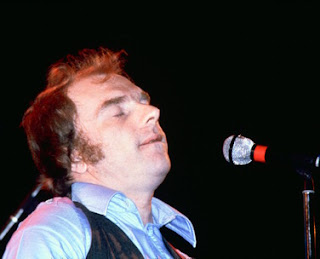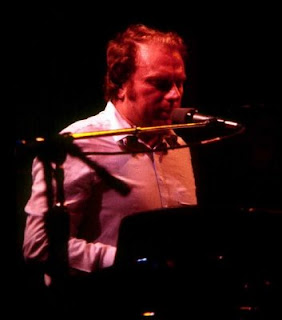Producer Mick Glossop On Mixing Van's Albums
 Mick Glossop has been engineering Van's albums for many years. Here is part of an interview he did in October 2006 with Resoulution magazine in which he speaks about mixing Van's albums. Also included is an interview from 1999.
Mick Glossop has been engineering Van's albums for many years. Here is part of an interview he did in October 2006 with Resoulution magazine in which he speaks about mixing Van's albums. Also included is an interview from 1999.From Mick Glossop's website:
I hear you’re mixing all of Van Morrison’s archive material for a boxed set.
The boxed set is an ongoing project. A huge amount of tape arrived from the US at the Wool Hall studio about 15 years ago. They were recordings from all the sessions Van had ever done, presumably during the entire Warner period. Some of the material was mixed immediately and came out as the Philosopher’s Stone album, pretty much everything else has been mixed by now, I’ve spent a fair amount of time doing that. It was extremely enjoyable, there were some great bands, great playing and performances. It was fabulous fun to work on, the tape was running all the time during most sessions, so you get the atmosphere and chat from the time. A lot of the tapes were not labelled, so a lot of detective work went on. Fortunately Van’s memory is incredible, he was right there with all the names of people he’d played with 30 years ago.
Van’s Inarticulate Speech Of The Heart album was recorded here at The Town House, wasn’t it?
We spent six days in the old Studio 2, which doesn’t exist any more, I think we recorded 12 or 13 songs including Rave On John Donne.
So can you now exclusively reveal to Resolution readers the existence of an extended studio version of John Donne?
It’s one of the longest tracks Van has recorded in the studio, 32 minutes or something — we had to change the tapes in the middle of it — or maybe we had two machines running, I can’t quite remember. A lot of editing went on. But that’s what happens with free improvisation, which is what largely developed in that song. That’s a particular type of Van Morrison song which starts out as a sheet of lyrics and some melodic ideas on his part, but basically nobody knows what’s going to happen.
Mick also did an interview in 1999 with Studio Sound in which he talks about the recording process with Van:
A case in point is Van Morrison, with whom Mick Glossop has collaborated on no less than 13 albums since kicking things off with the Wavelength project in 1977.
'I remember something that happened with his saxophone part on 'Celtic Swing',' says Glossop with regard to one of the singles on Van the Man's 1982 album, Inarticulate Speech of the Heart. 'He was playing a low note and it wouldn't speak properly. The key wouldn't seal, so we just got this kind of rushing air sound, but he carried on playing and he was really furious about it afterwards. "The bloody thing only got serviced the other day and it's still not working properly!" However, it was left on the record and a lot of people have since remarked about that, because it's a very interesting sound; the sound of the air blowing through the key of the sax. At the time Van was upset about it, but other people thought it should be left in because it was atmospheric, which is not something that he would normally do.
'He's very much a Take 1 person and he's certainly not obsessed with technique in the technical sense. He's very into the feel and he's had a big influence on me in that respect, and he usually okays quite a few things which other people would iron out, such as a guitar that might be slightly out of tune. If the performance has got the feel and the spontaneity and the creativity that it needs then he'll accept that. He'll always sacrifice technical considerations for atmosphere and expression and feel, and from that point of view it's very good working with him. There have been several performances and overdubs where he's initially said, "No, that's fine, that's great", and I've thought, "He's going to redo that in a couple of weeks. I'm sure he's going to replace that overdub". However, two weeks later we've put the tape up and I've listened to it and thought, "Well, that's actually okay, isn't it? It's not a problem." I'd been sucked into being too focussed and too microscopic about it, and therefore in terms of my other work it's a very good thing for me to work on his sessions every now and again, because it just sets things in perspective. He's constantly got his mind on the performance, and that's very healthy.'
 Glossop also tries to keep the tape rolling in order to avoid missing out on any moments of artistic inspiration.
Glossop also tries to keep the tape rolling in order to avoid missing out on any moments of artistic inspiration.'The first time that I missed something with Van Morisson was at the Record Plant in Sausalito,' Glossop recalls. 'It was the second album that I did with him [Into the Music], as usual everything was live--live vocals, the band was playing live--and they all came into the control room to listen to playbacks for a couple of tracks. People were just hanging around chatting, and Van walked out into the studio and was tinkling around on the piano, and then he picked up his guitar and started tuning it. I was still talking to everybody else, and a couple of minutes later I looked out and he was strumming some idea or other. He was nowhere near his little recording area, but then the drummer wandered out there and he started playing along, followed by the piano player who started fingering a few notes in relation to what Van was doing. Well, this gradually evolved into a performance, and at that point I realised something was going on and we'd better put some tape on. Don't forget, we'd just been playing back a track and the master was still on there, and so we quickly spooled the tape off, put on a new reel and stuck the machine in Record but by that time they were already into the chorus of the song. Of course, because of the way that things work psychologically and musically, this ended up being the take, of which I hadn't recorded the first two minutes. I think they ended up having to do another take.
'As a result, ever since then I always have two tape machines, and if we're working with Dolbys--which is normally the case--I take wire leads from the back of the Dolby rack to both machines. That means there's always a tape machine ready to record. At the same time, quite often Van's songs will extend much longer than most people's--I mean, the longest live performance I recorded with him was about 32 or 33 minutes. You don't know how long it's going to be, so you have to have another machine that you can put in Record to catch the overlap instead of losing 15 seconds of the song.
 'Van does do a lot of stream-of-consciousness-type songs, where instead of lyrics he'll have a page of words or phrases that he dips into and a lot of other stuff is off the top of his head. There's no structure and the band members are just flying by the seat of their pants, and there are often misgivings from the musicians when they are put on the spot. He doesn't tell them what key the song is in, he doesn't tell them anything about the chord structure. They have to pick it up most of the time, and that's pretty tough. Obviously there will be mistakes and various musicians will feel that they haven't played as well as they could because they were feeling their way, and sometimes they're right and patch-ups will be done. However, quite often Van will insist that they don't redo their parts unless there's a really glaring error, because he knows that that first tentative performance has a unique quality purely because they had to play instinctively.
'Van does do a lot of stream-of-consciousness-type songs, where instead of lyrics he'll have a page of words or phrases that he dips into and a lot of other stuff is off the top of his head. There's no structure and the band members are just flying by the seat of their pants, and there are often misgivings from the musicians when they are put on the spot. He doesn't tell them what key the song is in, he doesn't tell them anything about the chord structure. They have to pick it up most of the time, and that's pretty tough. Obviously there will be mistakes and various musicians will feel that they haven't played as well as they could because they were feeling their way, and sometimes they're right and patch-ups will be done. However, quite often Van will insist that they don't redo their parts unless there's a really glaring error, because he knows that that first tentative performance has a unique quality purely because they had to play instinctively.'That's one of the massive things that I learned from him--there is something about a musician's performance which you can only get under those circumstances. I used to think the reason he didn't fill them in on the song's key was because he didn't think it was necessary and he just couldn't be bothered, but I now think that it's deliberate because he instinctively knows that they are going to have to feel their way. That's what it's about, and it also means that people can never overplay, because they have got to respond to what he is doing. It's a very human element about performance that is brought into the recording, and I think he knows that. He worked it out a long time ago and he's stubbornly stuck to it, and he gets the results by virtue of doing that.'

















































































































4 comments:
A very interesting read. Thanks for sharing this!
Thanks for posting this! A fascinating read and confirmation of the existence of one of those "Holy Grails," the extended "Rave on, John Donne." Now if someone could just convince Van to release it...And the part about Van's sax is equally interesting. What was accidental became a signature sound. Can anyone out there shed light on the harmonica over-dub that comes about 10 seconds in on "Tir Na Nog"?
My pleasure!
The Warner Years! Are takes from the AW album also included here?!
Post a Comment